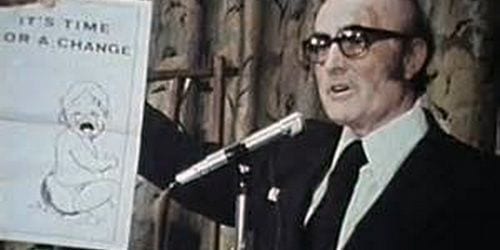
George Katsaros stands on a band stage as he declares “Monday September 1, 1975 as Labor Day” in Haverhill, Massachusetts. Wearing As the city’s mayor, he does so with a grandly generic genuflection to Americans who have “the right to work, the right to pursue both material well being and their spiritual well development.”
At the start of If It Fits, Katsoros is running for a third term as mayor, in the midst of a record that doesn’t quite comport with a dedication to these rights: the unemployment rate in Haverhill is bleak (from 1975 to 1976, it rises from 13 to 15%), owing mainly to the loss of manufacturing jobs. For decades, Haverhill was known as the Queen Slipper City, a moniker inspired by its thriving novelty shoe industry. Lately, though, employers are leaving town — the number of shoe-related companies has dropped from 134 in 1945 to just 29 in 1975 — and other industries haven’t filled the void. This despite Katsaros’ efforts to open Ward Hill Industrial Park, and event that seems to have served primarily as a photo op.
The decline is repeatedly visible in John Marshall and Mark Erder’s extraordinary documentary, which screened 29 July at the DocYard. Close interior shots show shoemakers bent over their work, a history receding even as the camera records it, while other long, tracking shots along the Merrimack River show abandoned buildings and vacant lots, construction projects unfinished and ambitions unfulfilled. These images are juxtaposed with assessments of what’s gone wrong by off-screen residents and business owners that convey a mix of distress and resignation. No matter the politicians’ promises that recovery is just around the corner, the bleak images and voiceovers suggest otherwise.
Each of the speakers has a slightly different take on where the turn came. It was cheap shoes made in Taiwan or “maybe down in Florida where there’s a lot of Cubans, they’ll work for any kind of money, including the minimum wage” that reshaped the local market. Or, the next generation of the shoe industry families isn’t handling its business. Or again, it’s that state agencies aren’t following “the rules,” they’re not hiring applicants “according to their need,” that is, according to the number of their dependents. No again, says Katsaros, cigar in hand. “You’re trying to make a social institution out of the private sector and that simply isn’t going to be done.”
If Katsaros might be seen as running against his own record, insisting he can improve on the recent past, he’s also, more obviously, running against Haverhill Fire Chief Lewis Burton. Katsaros maintains he’s the candidate best suited to sit down with “businessmen,” to convince them to bring jobs to Haverhill. Burton argues otherwise, that the failure has been caused by the mayor’s inept handling of the economy, resulting in the city’s “political instability.” Whether the source of the problem is external or internal, the solution remains elusive. As the opponents posture, the film consistently shows consequences: people out of work, streets empty.
The situation in Haverhill in 1975 can’t help but sound familiar to viewers today, as neither seems to have a specific idea of what to do, only vague ideas that the “private sector” providing more jobs or bringing “new businesses” to town. Katsaros attends a couple of functions, his self-presentation sometimes weary, sometimes resentful (“You can’t blame the mayor,” he tells one gathering, “If it wasn’t for me, [unemployment would] be much higher, if I didn’t know how to run the city”), while Burton tells a group of nursing home residents, “We cannot afford to maintain the type of facility that you live in, to provide the services that you have earned, if we live beyond our means and we are doing just that.” As he speaks, the camera cuts to one-shots of his listeners, looking bored or listless in their wheelchairs. He seems oblivious to how uninspired his talk must sound to them.
At another assembly, Burton makes his case to a Hispanic supporter, “Your people still willing to work hard. Some of the Americans who’ve been here all their lives, they’re soft, they’re not willing to work hard.” The man nods, sort of, as Burton plunges ahead with the aspirational part of his pitch: “There’s money to be made in this country and this community, somebody that’s willing to work hard, there’s always money to be made.” Both candidates offer up such bland estimations and prejudices, their visions and self-awareness dauntingly limited.
A convertible makes its way along Haverhill’s main street, a booster for the Committee to Reelect George Katsaros making her case with a bullhorn, “Happy Days Are Here Again” sounding on the PA system. As this track drops out, sociologist Frances Fox Piven offers her evaluation, that the city government is restricted to a “very small role” in the current shift. The mayor can “try to bring a few industries back, but the truth is, he had to bribe them back,” she says, with the “skilled work force here and their wages [that] were no longer very high compared to some other flourishing parts of the country.” The city can offer subsidies too, but this money must be ultimately drawn from taxes, paid by members of that work force, increasingly under- or unemployed.
This economic structure can’t possibly work, and so the politicians can’t possibly address it as such. And so they go on posturing and promising. The film ends on the election’s results — Burton wins. It can’t know or show that Katsaros comes back in 1977, when he’s reelected for a third term. Revealing these cycles in shrewd, unfussy juxtapositions, IF It Fits offers a remarkably acute political and cultural analysis.

![Call for Papers: All Things Reconsidered [MUSIC] May-August 2024](https://www.popmatters.com/wp-content/uploads/2024/04/all-things-reconsidered-call-music-may-2024-720x380.jpg)



